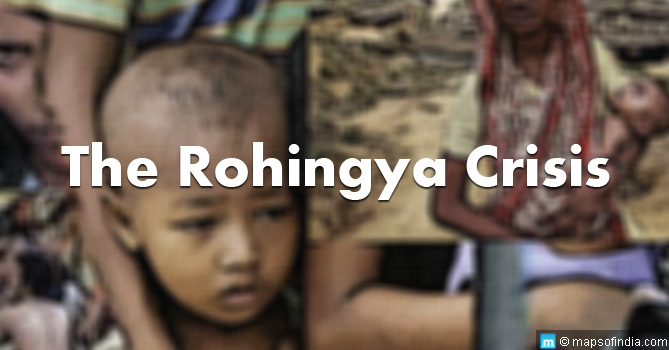Who Are The Rohingya Refugees?
The Rohingya community is a Sunni Islamic (Bengali-speaking) community from the state of Rakhine in Myanmar (previously Burma). Myanmar, however, refuses to acknowledge members of the community as citizens and claims that the Rohingya are Bangladeshis who (illegally) entered the country during the British colonial era. For over six decades, however, the Rohingya have lived in Myanmar despite having (allegedly) faced much discrimination, ostracism, and violence. Not only are the Rohingya deprived of the rights of ordinary citizens, their living conditions in Myanmar are reportedly dismal and they have been the target of many violent attacks.
Over the past two years militants from the Rohingya community have been repeatedly mounting attacks on Myanmar armed forces bases and border outposts. In a violent backlash the army of Myanmar has attacked and destroyed several Rohingya villages. Hundreds have been killed, women abused, and hundreds of thousands of Rohingya forced to flee their homes.
How Is India Involved?
News reports suggest that over 370,000 Rohingya Muslims have escaped from Myanmar over the past few years and a vast majority of them have sought refuge in Bangladesh. A common language and religion was expected to bring them the asylum they keenly seek. After having accommodated as many Rohingya refugees as it could Bangladesh is now keen on closing its doors and deporting the community.
Over 40,000 Rohingya refugees have crossed over from India’s borders with Bangladesh and Myanmar and are now illegally living in India. Apart from this there are some 14,000 United Nations High Commissioner for Refugees (UNHCR). The Indian government, too, is keen on deporting the Rohingya refugees who are currently in the country support for them from some quarters.
Why Does India Want To Deport The Rohingya?
The central government of India has filed an affidavit with the apex court of the country, the Supreme Court, regarding the Rohingya crisis. The government has sought to deport the Rohingya Muslims citing serious security threat to the country. Here are the top reasons that India wants to deport the Rohingya refugees –
- The Home Ministry claims that it has security inputs linking the Rohingya refugees with the Islamic State (IS), Pakistan’s intelligence agency the ISI, and other radical Islamic terrorist outfits such as the LeT. The government has said it is ready to confidentially share all its inputs with the court.
- The government is also worried that the presence of these refugees may spark incidents of violence against the Indian Buddhists in the country.
- It is after decades of independence that the north-eastern states have received the attention that they richly deserve. The states are in a nascent stage of development and any incident of Rohingya militancy in these parts (areas close to the Bangladesh or Myanmar border) may shatter the peace here.
- The government of India also claims to have proof connecting the Rohingya refugees to illegal financial activities such as mobilizing funds sourced through hawala activities.
- A number of instances have come to light where Rohingya refugees have attempted to illegally procure Indian identification documents such as birth certificates and Aadhaar cards.
Support for The Rohingya
In India, the Rohingya refugees have garnered some support from Islamic groups and from the Trinamool Congress Party of West Bengal. The Chief Minister of West Bengal recently said “It is not the right decision by the Central Government to deport them (Rohingya Muslims), as not everyone is a terrorist… We have to think about the several children among the Rohingya refugees. My party’s view is that every community has good people and bad people. There is a difference between commoners and terrorists, and that terrorists should be firmly dealt with but commoners should not suffer”.
On 12 September, 2017 a huge protest march was organized by about 18 Muslim outfits in the West Bengal capital, Kolkata, to protest the central government’s move to deport Rohingya refugees back to Myanmar. Between 25,000 and 35,000 protesters joined the march.
The support for Rohingya refugees is understandable given that they may face more atrocities and violence if deported to Myanmar. What seems unacceptable, though, is that this opportunity is taken by some to make hate speeches made in the pretext of support. Kolkata-based Shia cleric Maulana Shabbir Ali Azad Warsi addressed a gathering in the city inciting the crowd into violence, news reports said.
UP Dalit leader Mayawati also asked the central government to show leniency to the refugee community.






